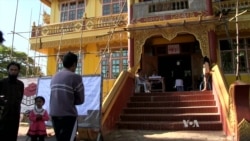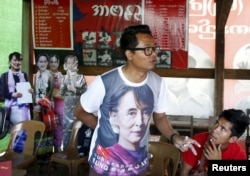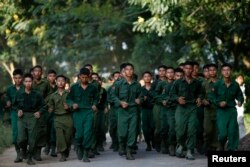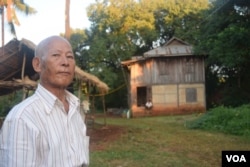Myanmar’s military-backed ruling party was facing a tough challenge as the country went to the polls Sunday, even in parts where it might have expected strong support.
In the Mandalay region town of Pyin Oo Lwin, the former summer capital of the British colonial government, a large section of voters have connections with the country’s elite officer training school where the generals who have ruled this country for decades were educated. But the legacies of that rule — which officially ended when a civilian administration took power in 2011 — appear to be hindering the Union Solidarity and Development Party’s (USDP) chances of winning votes.
Showing a purple ink stain on his finger, Pyin Oo Lwin resident Ko Ko said he cast his vote for the opposition National League for Democracy (NLD) Sunday morning. “Most people here will vote for the NLD,” he said. “They want change.”
Defense Services Academy
But about 8,000 votes in the town are expected to come from within the Defense Services Academy — Myanmar’s version of West Point — while thousands more votes will come from serving military personal, police officers, civil servants and families with ties to the army.
Ko Ko said he expected most of those people would likely remain loyal to the USDP, which is headed by President Thein Sein, a former general. But he believed solders would be under significant pressure from their superiors, who view NLD leader Aung San Suu Kyi with deep suspicion. “The generals tell the low-level soldiers: ‘Don’t forget who feeds you,’” he said.
With about 150,000 people in the township eligible to vote, a solid block of civilian votes for the NLD could be enough to retain the Lower House parliamentary seat here — which it won in a 2012 by-election — and could even help it to displace the powerful chief minister of Mandalay region, Ye Myint.
Buying votes
The former army commander is fighting to retain a regional parliamentary seat, but has been accused of buying votes by distributing solar panels, and giving other favors to rural villagers. He has also attempted to capitalize on Pyin Oo Lwin’s scourge of land issues by promising villagers that confiscated land will be returned.
Pyin Oo Lwin has become a hotspot for land disputes, which are a cause of angst against the government nationwide. During years of military rule, the authorities had free rein to take farm land for their own use; a right that was widely abused. Now much of that land is being leased to private companies for profitable agricultural projects.
“Almost every village in Pyin Oo Lwin is affected by land grabs,” said Michael Htun, a member of the 88 Generation Peace and Open Society activist group. He estimated that more than 40,000 hectares in the township had been seized over the years, adding that people consider the ruling USDP responsible for land problems. “People in these villages will surely not vote for the USDP,” he said.
In the picturesque village of Zee Bin Gyi, just outside Pyin Oo Lwin, about 1,200 hectares of productive farmland was taken from villagers in 1984 to build government buildings, including a police training school.
Land issues
Much of the land was not used by the authorities, but officials have shown no signs of returning it to villagers. Until September, that is, when campaigning began for an election that could see the military and its allies defeated and forced to hand over some power.
The chief minister, Ye Myint, has declared that part of the land will now be handed back to the village administrator to be distributed among the people. But who would get the land, and how and when it would be returned, are still unclear.
Efforts to get comment from the USDP in Pyin Oo Lwin were unsuccessful, but Ye Myint has rejected allegations that he is using his position improperly. “It is the government procedure [to return the land]. It is not to do with campaigning,” he told the Myanmar Times newspaper.
Zee Bin Gyi community elder Sone, however, said it was blatant electioneering. Most villagers would still take a long-term view and vote for the opposition, since they know that the ruling party is run by Myanmar’s former military rulers, he said.
“If you put spoilt rice in a new pot, it is still spoilt rice,” the 78-year-old said, quoting a piece of folksy wisdom used by Aung San Suu Kyi in her campaign speeches.
Taking on Ye Myint at the polls is local general practitioner Dr. Khin Maung Htay for the NLD. He told VOA that land problems would help him to gain support, despite the resources at the disposal of his opponent.
“It will be challenging to get a majority in a military town like this, but I think we can win,” he predicted.














